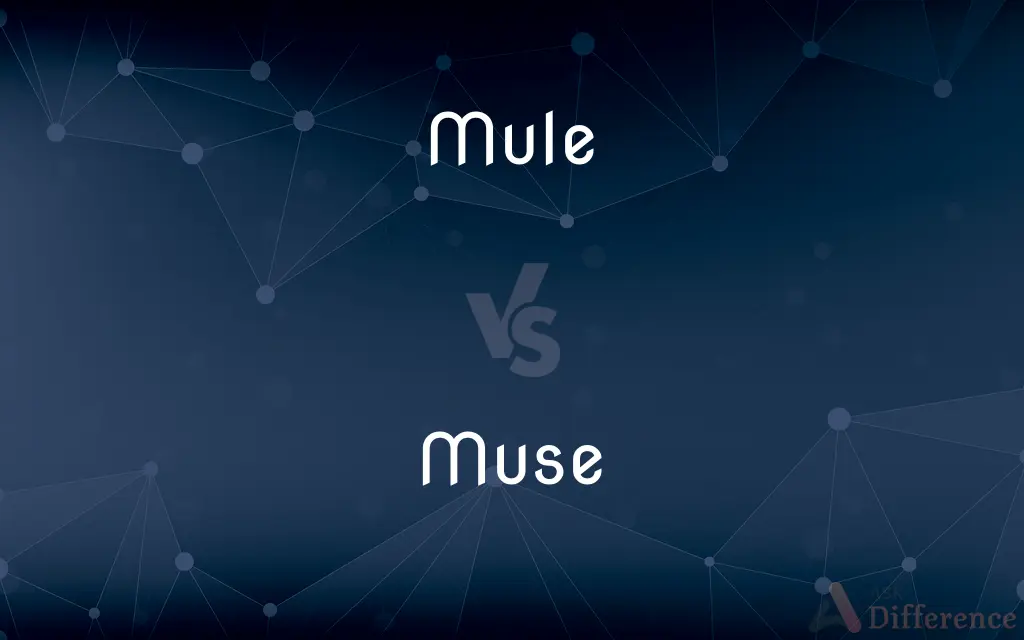Mule vs. Muse — What's the Difference?
Edited by Tayyaba Rehman — By Urooj Arif — Updated on April 18, 2024
Mule is a sterile hybrid animal resulting from a horse and donkey cross, known for strength and endurance; muse refers to a source of artistic inspiration or one of the nine Greek goddesses of arts and sciences.

Difference Between Mule and Muse
Table of Contents
ADVERTISEMENT
Key Differences
A mule is the offspring of a male donkey and a female horse, combining the traits of its parents to produce a strong, durable animal used primarily for work and transportation. In contrast, a muse in classical mythology is any one of the nine goddesses who inspire creativity in literature, arts, and sciences, serving as a symbolic source of inspiration.
Mules are prized for their physical abilities such as strength, endurance, and sure-footedness, making them suitable for tasks in challenging terrains. Whereas, a muse influences the mental and creative processes, often being credited by artists and writers as the impetus for their works.
Due to their hybrid nature, mules are generally sterile and cannot reproduce, highlighting their uniqueness in the animal kingdom. On the other hand, muses are immortal and timeless, representing concepts that perpetuate cultural and artistic growth across generations.
Mules are tangible and physically present, used globally in agriculture, transportation, and historical labor settings. Conversely, muses are intangible, existing primarily in the realm of ideas and as metaphorical sources of inspiration in artistic contexts.
In terms of cultural significance, mules have a historical and practical role in human societies, often associated with work and ruggedness. Muse, however, has a more ethereal and intellectual presence, commonly linked with creativity and the divine inspiration behind artistic achievement.
ADVERTISEMENT
Comparison Chart
Origin
Hybrid of donkey and horse
Greek mythology
Role
Physical labor and transportation
Inspiration in arts and sciences
Reproduction
Sterile (cannot reproduce)
Symbolic (not applicable)
Nature
Tangible, practical
Intangible, conceptual
Cultural Symbolism
Work, endurance, resilience
Creativity, divine inspiration
Compare with Definitions
Mule
In machinery, a term for certain types of spinning machines used in textiles.
The old mill's mule is still functional and on display.
Muse
Occasionally used to refer to thoughtful or absorbed deep thinking.
He was lost in a muse about the novel's complex characters.
Mule
A hybrid animal from a donkey and horse, typically sterile and used for burden or transport.
The farmer used his sturdy mule to plow the fields.
Muse
Any of the nine goddesses from Greek mythology representing the arts and sciences.
Calliope is known as the muse of epic poetry.
Mule
In genetics, a term used to describe any crossbreed that is usually sterile.
Like mules, all male ligers are sterile.
Muse
In contemporary settings, a muse can be a guiding spirit or a source of inspiration in non-artistic contexts.
The entrepreneur considered innovation as his muse for business strategies.
Mule
A type of strong, closed-toe, backless shoe.
She slipped into her mules before stepping out to the porch.
Muse
Used metaphorically to refer to someone who inspires creativity.
The breathtaking landscape served as a muse for her paintings.
Mule
Slang for someone who carries something for others, especially drugs.
The arrested man was merely a mule for the drug ring.
Muse
A person or personified force who is the source of inspiration for a creative artist.
The novelist talked about his wife being his muse.
Mule
A mule is the offspring of a male donkey (jack) and a female horse (mare). Horses and donkeys are different species, with different numbers of chromosomes.
Muse
To be absorbed in one's thoughts; engage in thought.
Mule
The sterile hybrid offspring of a male donkey and a female horse, characterized by long ears and a short mane.
Muse
To consider or say thoughtfully
Mused that it might take longer to drive than walk.
Mule
A sterile hybrid, as between a canary and other birds or between certain plants.
Muse
A state of reflection.
Mule
(Informal) A stubborn person.
Muse
Greek Mythology Any of the nine daughters of Mnemosyne and Zeus, each of whom presided over a different art or science.
Mule
A spinning machine that makes thread or yarn from fibers. Also called spinning mule.
Muse
A guiding spirit.
Mule
A small, usually electric tractor or locomotive used for hauling over short distances.
Muse
A source of inspiration
The lover who was the painter's muse.
Mule
(Slang) A person who serves as a courier of illegal drugs.
Muse
Muse(Archaic) A poet.
Mule
A backless slipper or shoe, often with a closed toe.
Muse
(of people) A source of inspiration.
Yoko Ono was John Lennon's wife, lover, and muse.
Mule
The generally sterile male or female hybrid offspring of a male donkey and a female horse.
Muse
(archaic) A poet; a bard.
Mule
The generally sterile hybrid offspring of any two species of animals.
Muse
An act of musing; a period of thoughtfulness.
Mule
A hybrid plant.
Muse
A gap or hole in a hedge, fence, etc. through which a wild animal is accustomed to pass; a muset.
Find a hare without a muse. (old proverb)
Mule
(informal) A stubborn person.
Muse
(intransitive) To become lost in thought, to ponder.
Mule
(slang) A person paid to smuggle drugs.
Muse
(transitive) To say (something) with due consideration or thought.
Mule
A coin or medal minted with obverse and reverse designs not normally seen on the same piece, either intentionally or in error.
Muse
(transitive) To think on; to meditate on.
Mule
(RPG) A MMORPG character, or NPC companion in a tabletop RPG, used mainly to store extra inventory for the owner's primary character.
Muse
(transitive) To wonder at.
Mule
Any of a group of cocktails involving ginger ale or ginger beer, citrus juice, and various liquors.
Muse
A gap or hole in a hedge, hence, wall, or the like, through which a wild animal is accustomed to pass; a muset.
Find a hare without a muse.
Mule
(sailing) A kind of triangular sail for a yacht.
Muse
One of the nine goddesses, daughters of Zeus and Mnemosyne, who presided over song and the different kinds of poetry, and also the arts and sciences; - often used in the plural. At one time certain other goddesses were considered as muses.
Granville commands; your aid, O Muses, bring:What Muse for Granville can refuse to sing?
Mule
A kind of cotton-spinning machine.
Muse
A particular power and practice of poetry; the inspirational genius of a poet.
Mule
A shoe that has no fitting or strap around the heel, but which covers the foot.
Muse
A poet; a bard.
Mule
To smuggle (illegal drugs).
Muse
Contemplation which abstracts the mind from passing scenes; absorbing thought; hence, absence of mind; a brown study.
Mule
A plant or vegetable produced by impregnating the pistil of one species with the pollen or fecundating dust of another; - called also hybrid.
Muse
Wonder, or admiration.
Mule
A very stubborn person.
Muse
To think closely; to study in silence; to meditate.
He mused upon some dangerous plot.
Mule
A machine, used in factories, for spinning cotton, wool, etc., into yarn or thread and winding it into cops; - called also jenny and mule-jenny.
Muse
To be absent in mind; to be so occupied in study or contemplation as not to observe passing scenes or things present; to be in a brown study.
Mule
A slipper that has no fitting around the heel.
Muse
To wonder.
Mule
Sterile offspring of a male donkey and a female horse
Muse
To think on; to meditate on.
Come, then, expressive Silence, muse his praise.
Mule
A slipper that has no fitting around the heel
Muse
To wonder at.
Muse
In ancient Greek mythology any of 9 daughters of Zeus and Mnemosyne; protector of an art or science
Muse
The source of an artist's inspiration;
Euterpe was his muse
Muse
Reflect deeply on a subject;
I mulled over the events of the afternoon
Philosophers have speculated on the question of God for thousands of years
The scientist must stop to observe and start to excogitate
Common Curiosities
Where are mules commonly used?
Mules are widely used in agricultural, transportation, and historical labor contexts.
How do muses influence creativity?
Muses are considered sources of inspiration, driving creativity and innovation in various artistic and scientific fields.
How do mules differ from hinnies?
Mules are bred from a male donkey and a female horse, while hinnies are from a male horse and a female donkey, with slight differences in size and robustness.
Who are the muses?
In Greek mythology, the muses are nine goddesses who symbolize the arts and sciences and inspire creativity.
How are muses depicted in classical art?
Muses are often depicted with symbolic attributes like musical instruments or scrolls, representing their domains in the arts and sciences.
What is a mule?
A mule is a hybrid animal, the offspring of a male donkey and a female horse, known for its strength and endurance but is sterile.
Can mules reproduce?
No, mules are typically sterile and cannot reproduce.
What are the physical characteristics of a mule?
Mules are known for their strength, endurance, and sure-footedness, often inheriting the best qualities of both horses and donkeys.
What makes mules preferable for certain tasks over horses?
Mules tend to be more durable, require less food, and are more patient and sure-footed than horses, making them suitable for rugged terrains.
Can muses be real people?
Yes, in modern contexts, a muse can be a real person who inspires an artist, writer, or musician.
What is the role of a muse in literature?
In literature, a muse is often a metaphorical source of inspiration that authors credit for their creative ideas and stories.
Are there different types of mules based on parent breeds?
Yes, the characteristics of mules can vary depending on the breeds of the parent horse and donkey.
Is muse used in any contexts outside of the arts?
Yes, muse can also refer to any source of inspiration, including in business or innovation contexts.
What is the cultural significance of muses in history?
Muses have been emblematic of artistic and scientific inspiration throughout Western history, often represented in art and literature.
What's the origin of the concept of a muse in mythology?
The concept originated from Greek mythology, where muses were considered goddesses who inspired all forms of art and scholarly endeavor.
Share Your Discovery

Previous Comparison
Mentality vs. Mindset
Next Comparison
Alex vs. AlecAuthor Spotlight
Written by
Urooj ArifUrooj is a skilled content writer at Ask Difference, known for her exceptional ability to simplify complex topics into engaging and informative content. With a passion for research and a flair for clear, concise writing, she consistently delivers articles that resonate with our diverse audience.
Edited by
Tayyaba RehmanTayyaba Rehman is a distinguished writer, currently serving as a primary contributor to askdifference.com. As a researcher in semantics and etymology, Tayyaba's passion for the complexity of languages and their distinctions has found a perfect home on the platform. Tayyaba delves into the intricacies of language, distinguishing between commonly confused words and phrases, thereby providing clarity for readers worldwide.
















































